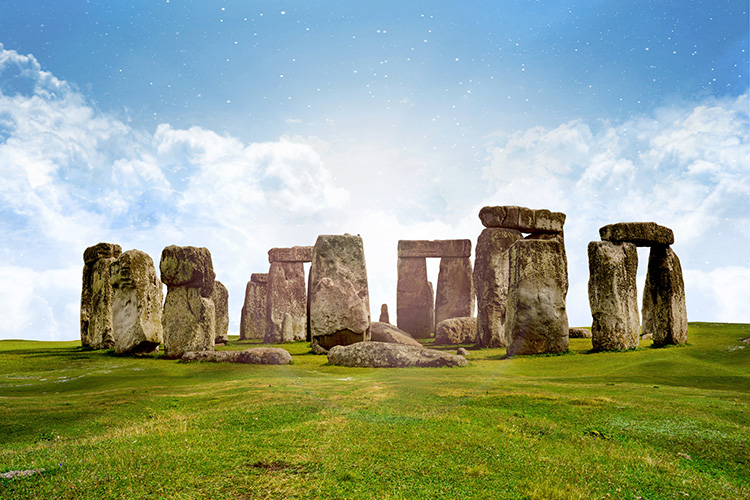(Undo revision 38667 by GopnikAward (talk)) Tag: Undo |
No edit summary Tag: Visual edit |
||
| Line 1: | Line 1: | ||
[[File:Stonehenge.jpg|thumb|258x258px|Stonehenge.]] | [[File:Stonehenge.jpg|thumb|258x258px|Stonehenge.]]'''Primitive communism''' was the economic system that was present before the first use of [[agriculture]] and the later formation of civilization, when [[class society]] began. | ||
'''Primitive communism''' was | In primitive communist societies, people lived in groups of up to a few dozen and all [[Labour|labor]] was communal. Groups hunted and gathered their food, which they consumed together. They also made clothes out of animal skin and tools out of bones. Many people died from hunger or wild animals, and cannibalism also existed in this period.<ref name=":0">{{Citation|author=Economics Institute of the Academy of Sciences of the U.S.S.R|year=1954|title=Political Economy|chapter=The Primitive Communal Mode of Production|page=|pdf=https://revolutionarydemocracy.org/archive/PoliticalEconomy.pdf|city=London|publisher=Lawrence & Wishart|chapter-url=https://www.marxists.org/subject/economy/authors/pe/pe-ch01.htm|mia=https://www.marxists.org/subject/economy/authors/pe/index.htm}}</ref> | ||
== Means of production == | |||
The [[means of production]] were very simple and therefore developed very slowly. The first tools used by humans were chipped stones and sticks. Eventually, they learned how to create fire, which they used to cook food, develop more tools, and protect themselves from wild animals. Fire also offered protection from the cold, helping humanity spread across the world. | |||
As humanity progressed, they began combining wood and sharpened stone to make stronger tools used for hunting large animals and fishing. For hundreds of thousands of years, stone was the main material used in tools, but copper, bronze, and iron later replaced it. | |||
The bow and arrow made hunting much more efficient and led to the development of cattle breeding. Hunters began to domesticate animals, starting with the dog and then goats, cattle, pigs, and horses. They also learned that seeds could be used to grow plants, marking the beginning of agriculture. People initially tilled the ground by hand, then with sticks, and finally with hoes. As cattle and metal tools were introduced to agriculture, making it more productive, tribes created permanent homes and [[Social class|classes]] began to develop.<ref name=":0" /> | |||
== See also == | |||
== See | |||
* [[Communism]] | * [[Communism]] | ||
| Line 15: | Line 15: | ||
[[Category:History]] | [[Category:History]] | ||
[[Category:Communism]] | [[Category:Communism]] | ||
[[Category:Modes of production]] | [[Category:Modes of production]] | ||
Revision as of 22:28, 8 January 2023

Primitive communism was the economic system that was present before the first use of agriculture and the later formation of civilization, when class society began.
In primitive communist societies, people lived in groups of up to a few dozen and all labor was communal. Groups hunted and gathered their food, which they consumed together. They also made clothes out of animal skin and tools out of bones. Many people died from hunger or wild animals, and cannibalism also existed in this period.[1]
Means of production
The means of production were very simple and therefore developed very slowly. The first tools used by humans were chipped stones and sticks. Eventually, they learned how to create fire, which they used to cook food, develop more tools, and protect themselves from wild animals. Fire also offered protection from the cold, helping humanity spread across the world. As humanity progressed, they began combining wood and sharpened stone to make stronger tools used for hunting large animals and fishing. For hundreds of thousands of years, stone was the main material used in tools, but copper, bronze, and iron later replaced it.
The bow and arrow made hunting much more efficient and led to the development of cattle breeding. Hunters began to domesticate animals, starting with the dog and then goats, cattle, pigs, and horses. They also learned that seeds could be used to grow plants, marking the beginning of agriculture. People initially tilled the ground by hand, then with sticks, and finally with hoes. As cattle and metal tools were introduced to agriculture, making it more productive, tribes created permanent homes and classes began to develop.[1]
See also
- ↑ 1.0 1.1 Economics Institute of the Academy of Sciences of the U.S.S.R (1954). Political Economy: 'The Primitive Communal Mode of Production'. [PDF] London: Lawrence & Wishart. [MIA]